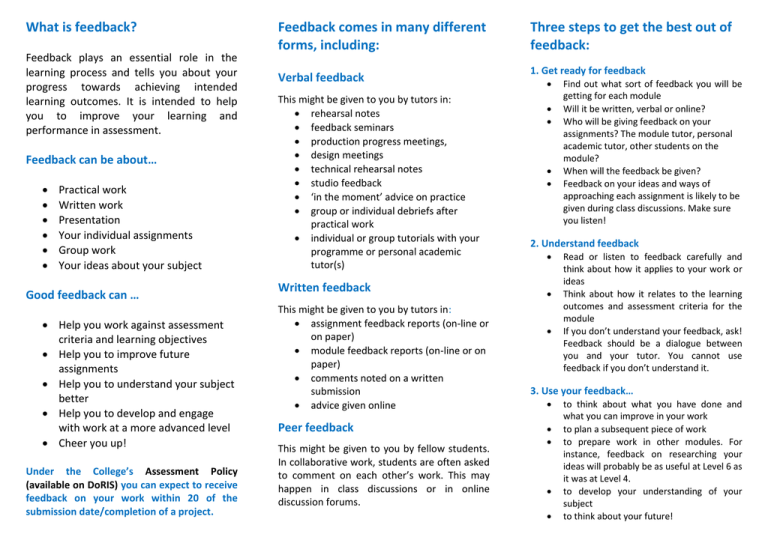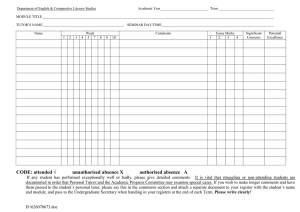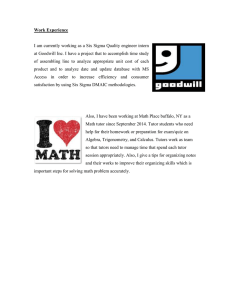What is feedback? Feedback comes in many different forms
advertisement

What is feedback? Feedback plays an essential role in the learning process and tells you about your progress towards achieving intended learning outcomes. It is intended to help you to improve your learning and performance in assessment. Feedback can be about… Practical work Written work Presentation Your individual assignments Group work Your ideas about your subject Good feedback can … Help you work against assessment criteria and learning objectives Help you to improve future assignments Help you to understand your subject better Help you to develop and engage with work at a more advanced level Cheer you up! Under the College’s Assessment Policy (available on DoRIS) you can expect to receive feedback on your work within 20 of the submission date/completion of a project. Feedback comes in many different forms, including: Verbal feedback This might be given to you by tutors in: rehearsal notes feedback seminars production progress meetings, design meetings technical rehearsal notes studio feedback ‘in the moment’ advice on practice group or individual debriefs after practical work individual or group tutorials with your programme or personal academic tutor(s) Written feedback This might be given to you by tutors in: assignment feedback reports (on-line or on paper) module feedback reports (on-line or on paper) comments noted on a written submission advice given online Peer feedback This might be given to you by fellow students. In collaborative work, students are often asked to comment on each other’s work. This may happen in class discussions or in online discussion forums. Three steps to get the best out of feedback: 1. Get ready for feedback Find out what sort of feedback you will be getting for each module Will it be written, verbal or online? Who will be giving feedback on your assignments? The module tutor, personal academic tutor, other students on the module? When will the feedback be given? Feedback on your ideas and ways of approaching each assignment is likely to be given during class discussions. Make sure you listen! 2. Understand feedback Read or listen to feedback carefully and think about how it applies to your work or ideas Think about how it relates to the learning outcomes and assessment criteria for the module If you don’t understand your feedback, ask! Feedback should be a dialogue between you and your tutor. You cannot use feedback if you don’t understand it. 3. Use your feedback… to think about what you have done and what you can improve in your work to plan a subsequent piece of work to prepare work in other modules. For instance, feedback on researching your ideas will probably be as useful at Level 6 as it was at Level 4. to develop your understanding of your subject to think about your future! FEEDBACK MYTHS Feedback just explains your mark! NO…IT DOES MUCH MORE THAN THAT Feedback is not a justification for your mark. For some pieces of work you will receive a grade or mark and feedback comments. Your mark will reflect your achievement for that particular piece of work, whilst the feedback can provide you with much more, including suggestions to consider for your next piece of work. Feedback just a set of instructions! NO… IT IS MEANT TO MAKE YOU THINK! For more information about feedback, see the College’s Assessment Policy on the Document, Resource and Information System (DoRIS) Or talk to your tutor! Feedback does not comment on every aspect of your assessment. In providing feedback your tutors will select and comment on the most important areas that you've done well at and where you can improve (e.g. if it doesn't mention spelling mistakes that's not to say that you didn't make any or if it doesn't mention that you showed a good understanding of a primary text, that is not to say that you didn't demonstrate this). Tutors carefully select their feedback in order to best help your learning. Feedback only applies to one piece of work! NO… IT CAN APPLY TO ALL THE WORK YOU DO Feedback is not the end of a process. Often you will receive feedback some time after completing a piece of work, when you may be more focussed on your next assignment. However, good feedback at university is designed to contribute to your ongoing development and you should think about how you can make best use of feedback on previous work to help you improve the next piece. Lamorbey Park, Burn Oak Lane Sidcup DA15 9DF 020 8308 2600 www.bruford.ac.uk http://vle.bruford.ac.uk Updated September 2015 MAKING FEEDBACK WORK FOR YOU!


